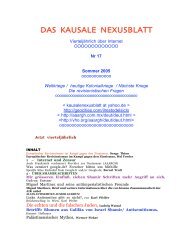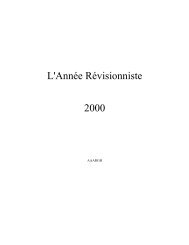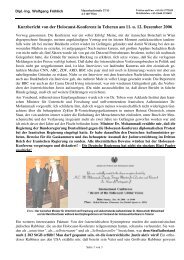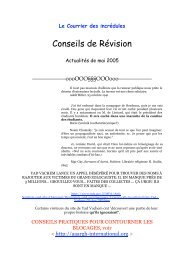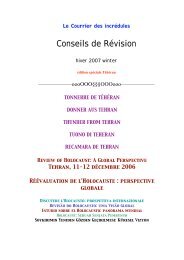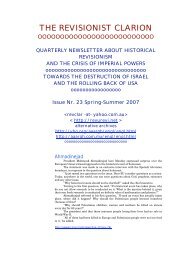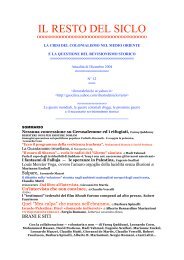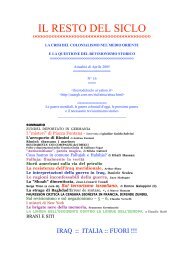Numéro 60--- ÃTà 2007 - Vho
Numéro 60--- ÃTà 2007 - Vho
Numéro 60--- ÃTà 2007 - Vho
You also want an ePaper? Increase the reach of your titles
YUMPU automatically turns print PDFs into web optimized ePapers that Google loves.
GAZETTE DU GOLFE ET DES BANLIEUES / <strong>60</strong> / ÉTÉ <strong>2007</strong><br />
malfeasance and violence<br />
• implement better financial controls throughout the government to prevent government funds from<br />
flowing to militias and other violent groups<br />
• ensure that coalition forces patrol with Iraqi units—not alone.<br />
U.S. efforts should focus not on ingratiating the coalition with the Iraqi public but on winning Iraqis’<br />
support for their own government.<br />
Economic Assistance. The United States should focus its economic aid policies to help the Iraqi<br />
government increase stability and reduce sectarian violence. Other programs should be postponed<br />
until stability is improved, as they are wasteful of resources and ineff ective under violent conditions.<br />
In particular, the United States should<br />
• press the Iraqi government to continue to raise and eventually fully liberalize gasoline and diesel<br />
prices to prevent sectarian militias and insurgents from profiting from black markets for these<br />
commodities<br />
• improve and restructure the operations of the Iraqi oil ministry and provide technical assistance to<br />
create a professionally managed national oil company, which will increase oil production, exports,<br />
and government revenue to support eff orts to quell the violence<br />
• help the Iraqi government improve security for pipelines and terminals, both through private<br />
security providers and through more capable Iraqi forces.<br />
In addition to identifying alternative approaches and policies to help reduce the violence in Iraq, this<br />
monograph recommends that the U.S. government begin considering ext steps. Some policies should<br />
not be undertaken unless violence declines. Other policies will become necessary if and when the<br />
United States determines that its attempts to reduce violence in Iraq have failed and decides to<br />
withdraw.<br />
If—and only if—violence declines, the United States should adopt policies and programs to<br />
ensure that a stabilized Iraq does not slip back into conflict. If violence declines, the United States<br />
should commit to continuing to provide security assistance in Iraq. It also should encourage the<br />
international community to pledge its support for the inviolability of Iraq’s borders and to commit to<br />
Iraq’s security. If the security situation stabilizes, the United States should support Iraqi government<br />
eff orts to demobilize, disarm, and reintegrate those active in sectarian militias and insurgent groups<br />
into peaceful society. A sharp decline in violence would also enable the United States to provide<br />
greater economic support to rebuild Iraq’s infrastructure and reform its social welfare programs,<br />
helping to cement stability.<br />
However, none of these policies can effectively be undertaken while violence levels remain high.<br />
Attempts to pursue such policies under conditions of continuing confl ict will waste resources and<br />
likely backfire.<br />
If the violence fails to decline, pressure to withdraw troops will become more difficult to resist.<br />
Well in advance of any decision to withdraw, the U.S. government should prepare to mitigate the<br />
consequences of continuing violence and of its curtailed presence. If the United States decides to<br />
withdraw, it should<br />
• inform the Iraqi government and public, Iraq’s neighbors, and U.S. allies, of U.S. plans<br />
• reassure U.S. friends and allies that withdrawal from Iraq does not mean that the United States<br />
plans to evacuate other bases or reduce its commitments to other countries in the region<br />
• stage the withdrawal such that it can be undertaken safely and deliberately<br />
• work through the United Nations to obtain guarantees of Iraq’s territorial integrity<br />
• assist Iraqi refugees by supporting neighboring countries, assisting in resettlement efforts, and<br />
helping specifically those refugees who worked for or helped the coalition<br />
• be prepared to build and maintain friendly relations with whatever Iraqi government (or<br />
governments) ultimately emerges. <br />
This research brief describes work done for RAND Project AIR FORCE and documented in U.S.<br />
Policy Options for Iraq: A Reassessment, by Olga Oliker, Keith Crane, Audra K. Grant,<br />
Terrence K. Kelly, Andrew Rathmell, and David Brannan, MG-613-AF (available at<br />
http://www.rand.org/pubs/monographs/MG613), <strong>2007</strong>, 102 pp., ISBN: 978-0-8330-4168-5. The<br />
RAND Corporation is a nonprofit research organization providing objective analysis and effective<br />
solutions that address the challenges facing the public and private sectors around the world. RAND’s<br />
publications do not necessarily reflect the opinions of its research clients and sponsors. R® is a<br />
registered trademark.<br />
— 70 —



